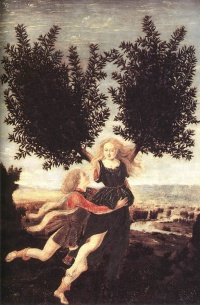Apollo
From The Art and Popular Culture Encyclopedia
|
"THe Emperor Iustinian, that great Compiler of Statutes, and Books of Civil Law, some few daies since shewed a new Law to Apollo, to have his Majesties approbation of it: wherein men were strictly forbidden killing themselves. Apollo was so astonished at this Law, as fetching a deep sigh, he said; Is the good Government of mankind, Iustinian, fallen then into so great disorder, as men, that they may live no longer, do voluntarily kill themselves?"--"Generale Riforma dell' Universo" by Trajano Boccalini, Monmouth translation "The quarrel between Apollo and Dionysus is the quarrel between the higher cortex and the older limbic and reptilian brains".--Sexual Personae (1990) by Camille Paglia |

|
Related e |
|
Featured: |
In Greek and Roman mythology, Apollo (Ancient Greek, Apóllōn, the ideal of the kouros (a beardless youth), was the archer-god of medicine and healing, light, truth, archery and also a bringer of death-dealing plague. He was the son of Zeus and Leto.
In literary contexts, Apollo represents harmony, order, and reason—characteristics contrasted with those of Dionysus, god of wine, who represents ecstasy and disorder. The contrast between the roles of these gods is reflected in the adjectives Apollonian and Dionysian. However, the Greeks thought of the two qualities as complementary: the two gods are brothers, and when Apollo at winter left for Hyperborea, he would leave the Delphic oracle to Dionysus. This contrast appears to be shown on the two sides of the Borghese Vase.
Attributes and symbols
Apollo's most common attributes were the bow and arrow. Other attributes of his included the kithara (an advanced version of the common lyre), the plectrum and the sword. Another common emblem was the sacrificial tripod, representing his prophetic powers. The Pythian Games were held in Apollo's honor every four years at Delphi. The bay laurel plant was used in expiatory sacrifices and in making the crown of victory at these games. The palm was also sacred to Apollo because he had been born under one in Delos. Animals sacred to Apollo included wolves, dolphins, roe deer, swans, cicadas (symbolizing music and song), hawks, ravens, crows, snakes (referencing Apollo's function as the god of prophecy), mice and griffins, mythical eagle–lion hybrids of Eastern origin.
As god of colonization, Apollo gave oracular guidance on colonies, especially during the height of colonization, 750–550 BCE. According to Greek tradition, he helped Cretan or Arcadian colonists found the city of Troy. However, this story may reflect a cultural influence which had the reverse direction: Hittite cuneiform texts mention a Minor Asian god called Appaliunas or Apalunas in connection with the city of Wilusa attested in Hittite inscriptions, which is now generally regarded as being identical with the Greek Ilion by most scholars. In this interpretation, Apollo’s title of Lykegenes can simply be read as "born in Lycia", which effectively severs the god's supposed link with wolves (possibly a folk etymology).
In literary contexts, Apollo represents harmony, order, and reason—characteristics contrasted with those of Dionysus, god of wine, who represents ecstasy and disorder. The contrast between the roles of these gods is reflected in the adjectives Apollonian and Dionysian. However, the Greeks thought of the two qualities as complementary: the two gods are brothers, and when Apollo at winter left for Hyperborea, he would leave the Delphic oracle to Dionysus. This contrast appears to be shown on the two sides of the Borghese Vase.
Apollo is often associated with the Golden Mean. This is the Greek ideal of moderation and a virtue that opposes gluttony.
See also

